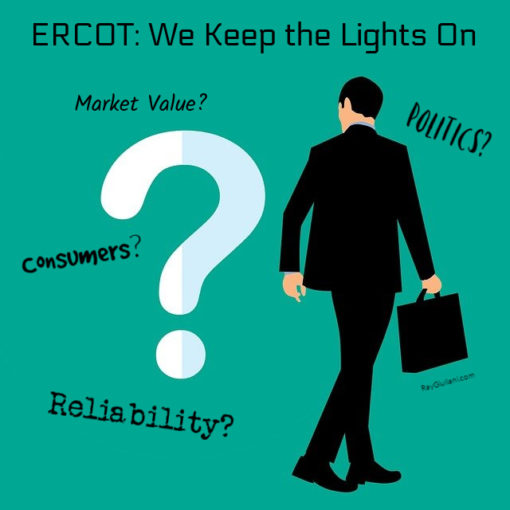 by Ray Giuliani
by Ray Giuliani
ERCOT 101; Do Texans really believe that a POLITICAL solution to a BUSINESS problem is the right answer to their deregulated electric power market problems?
In the late 1990s, the Texas legislature decided to deregulate the electric power industry which included the formation of ERCOT.
Prior to deregulation, investor-owned generation companies had a compact with its consumers through the Public Utility Commission of Texas. Those generation companies assumed a BUSINESS obligation to serve in return for a reasonable BUSINESS rate of return for its investors. The Public Utility Commission was tasked with administering that compact. The generation companies were keenly aware of the BUSINESS consequences associated with a failure to serve its customers.
With electric power deregulation in Texas, ERCOT was established as a non-profit all-inclusive quasi-government membership entity with stakeholder members from all sectors of the electric power supply/demand chain from electric generation through consumption. The Public Utility Commission was to regulate the fee charged to electricity consumers to fund ERCOT. It was also assumed that they would oversee ERCOT’s obligation to serve.
But how would that work. ERCOT’s role was limited to operating a real-time ERCOT wholesale balancing market to ensure supply adequacy. ERCOT did not own generation, transmission or distribution facilities and had no control over the operation of any of that equipment. It had no control over the performance of a generating unit. In addition, ERCOT had nothing to do with fuel adequacy. Generation companies were responsible for fuel to show up to run a generating unit, not ERCOT.
ERCOT’s name was the Electric Reliability Council of Texas, but in reality, it had very little to do electric grid reliability. If scheduled generation didn’t show up, it wasn’t ERCOT’s fault. Moreover, investors in generating units no longer had an obligation to serve and were no longer financially exposed for a failure to perform. In fact, with some generating units failing to perform, other generators would benefit from skyrocketing prices!
The bottom line is that ERCOT was a POLITICAL solution to the BUSINESS problems falling out from the deregulation of vertically integrated utilities. The BUSINESS of an obligation to serve and BUSINESS rate of return was replaced by a POLITICAL obligation to serve with a POLITICAL penalty for failure to perform. When things go wrong, just blame ERCOT and fire their CEO.
Did anyone really think that would work?
ERCOT provides Texans with what is arguably the best world-class supply/demand balancing service and energy accounting platform to enable wholesale and retail electric power competition. But it needs to remove the word “Reliability” from its name as it has nothing to do with equipment reliability or fuel adequacy for electric power generation.
That is why Texas legislators are revisiting the problem of electric power reliability in a deregulated market. Their solution is likely to provide a foundation for electric power reliability across the globe as we transition more and more to cleaner fuel sources with intermittent fuel availability.
Raymond Giuliani, former Chief of Market Operations at ERCOT, has pulled back the curtain on the inner workings of ERCOT in his new book, The Stakeholders’ Golden Rule, available now at Barnes & Noble, Amazon, and Books A Million.




